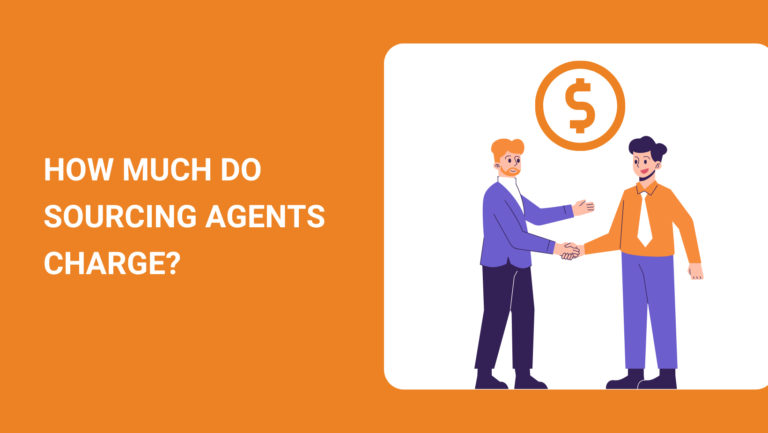Sourcing products involves more than just finding a reliable supplier. It requires securing quality products at a fair price and also figuring out the logistics of shipping and delivery.
Most entrepreneurs also have to juggle all this while attending to other business responsibilities.
These challenges have led to the rise of sourcing agents. They are a valuable resource for busy or inexperienced entrepreneurs who may not have the time or connections to source quality goods.
In today’s blog, we highlight how sourcing agents work, why their services matter, and also answer the top dollar question: how much do sourcing agents charge?
Let’s get to learning, shall we?
What Is a Sourcing Agent?

A sourcing agent is a professional that assists businesses in finding specific products or product manufacturers. They streamline the procurement process by conducting research, price negotiations, quality inspections, and other essential logistics.
This service is particularly beneficial for businesses looking to import from overseas markets like China, where navigating language barriers and regulatory requirements can be challenging.
Some sourcing agents work alone or in partnership with one or two other agents. However, most sourcing agents come together to form a sourcing company where they can:
- Attend to more clients
- Offer a wider pool of expertise
- Build a more formidable reputation and networks with product suppliers
China and Asia, in general, have the highest population of sourcing agents. This is mostly because the region has a high number of factories whose affordable prices attract lots of entrepreneurs worldwide.
What Is a Sourcing Fee?
A sourcing fee is the payment a business makes to a sourcing agent or agency for their services in finding reliable suppliers, negotiating terms, and facilitating product purchases.
This fee can cover a range of tasks, from initial product research and supplier verification to order follow-up and quality inspections, depending on what the agent offers.
Types of Sourcing Agent Fees
Sourcing agents’ fee structure is based on different billing models. Here are a few of them and how they work.
Hourly or Monthly Fees

In this model, your sourcing agent charges you based on the amount of time that they have spent performing the sourcing tasks you request.
They may ask you to remit payment at the end of a task. Alternatively, if the process takes longer, they may request weekly, bi-weekly, or monthly payments.
Pros
- Your fees are limited to the services you request.
- Sourcing agents that bill this way tend to accommodate extra requests like translating contracts and other errands that may not be included in a contract with a fixed fee.
Cons
- It is hard to obtain a cost estimate for this type of billing because neither party knows how long the sourcing process will take.
- Unscrupulous agents could unnecessarily prolong processes to inflate your bill.
Fixed Fees
Some sourcing agents have predetermined fees for particular services. For instance, an agent could state that they charge $200 to find suppliers and obtain quotes as well as any other details you may require.
Pros
- The fees are predictable and you can tell right from the start if they match your budget.
- Fixed fees are standard and thus do not offer skewed advantages based on quantities or the type of goods you are sourcing.
Cons
- Fixed fees are strictly for specific tasks. You are, therefore, likely to pay a separate fee for each task which can turn out to be quite costly.
- If you have to pay the fee upfront, there is no guarantee that the quality of the services will fulfill your sourcing needs.
A Percentage Fee/Commission

Some sourcing agents charge a fixed percentage of the value of your order. The average rate is about 3 to 10% but it could be higher depending on the agent and the scope of their services.
The fee is calculated as follows:
Sourcing Agent Fees = (The Percentage × Order Cost) + Shipping Costs
Shipping costs differ based on factors such as weight and distance. Sourcing agents thus provide prices for those services on a case-by-case basis instead of factoring them into the order cost.
Commitment + Percentage Fees
A commitment fee is what you pay before the sourcing agent begins working on your request.
Some agents request it because some clients place sourcing requests with no serious intention to buy. While this is not wrong, it means that the sourcing agent works to find suppliers in vain, which is rather unfair. The fee makes the deal fair for all involved.
The percentage fee is, as we mentioned above, calculated based on the order amount plus shipping costs. So the total fees in this pricing model would work out as follows:
Sourcing Agent Fees = Commitment Fee + (Commission Percentage × Order Cost) + Shipping Costs
Pros
- Paying based on a percentage usually covers multiple procedures involved in the purchase.
- It is fairly easy to get a realistic cost estimate based on the percentage.
Con
- Commissions can get quite expensive if your order amount is high.
China Sourcing Agent Fees
China sourcing agent fees can vary based on the agent’s service package, the size of the order, and the complexity of the tasks involved.
Here’s a breakdown of typical fee structures:
Basic Sourcing Fees: For fundamental services like identifying suppliers or conducting initial communication, sourcing agents may charge a flat fee ranging from $50 to $200. This setup works well for smaller, one-time sourcing needs.
Percentage-Based Fees: For comprehensive services—including supplier verification, price negotiation, quality checks, and shipping arrangements, many agents charge a commission based on the order value.
Typical rates range from 5% to 10%, with some agents charging higher percentages for more intricate projects. But bear in mind that the commission of some experienced supplier can also go up to 20%.
Hourly or Monthly Rates: Agents hired on an hourly basis generally charge $20 to $100 per hour, which can be ideal for ongoing consultations or extensive research projects.
For clients needing ongoing sourcing, quality assurance, and logistics coordination, agents may offer monthly retainers, often starting at $1,000.
Additional Charges for Quality Control and Logistics: Certain tasks, such as factory audits, on-site product inspections, or third-party certification, may incur additional charges.
Some sourcing agents offer custom pricing for these services to provide targeted support.
Choosing the Best Sourcing Agent in China
Choosing a sourcing agent in China involves balancing costs with service value. Look for agents experienced in regions relevant to your products (e.g., Guangdong for electronics or Yiwu sourcing agents for small goods), as this can make the sourcing process more efficient.
The best agents demonstrate transparency, provide accurate cost estimates, and maintain high standards for quality control, ensuring both reliable sourcing and a positive customer experience.
Factors That Affect Sourcing Agent Fees
As you compare sourcing agents, you may notice that there is hardly a baseline because their fees vary quite a bit. Let’s explore some key factors that lead to such differences.
The Scope of Service

The more services you require, the higher the fees you are likely to incur.
For example, a client that only requires product sourcing may pay less than a client that requires a sourcing agent to work with them through a private labeling project.
Urgency
When you have an urgent sourcing need, you may need a sourcing agent to prioritize your request so that you can meet your deadline. In such instances, you will likely have to pay more to facilitate them to expedite the entire sourcing process.
The Type of Goods

Sourcing agents in some niches charge higher commissions or fees simply based on the fact that they deal in high-value goods.
This is not a common factor but it is, nonetheless, real. You may, for instance, encounter it if you require a generally scarce product like rare metals.
Timelines
The longer a sourcing agent serves you the higher the fees. This is particularly relevant in long-term projects like when you are developing a new product.
How Do Sourcing Agents Work?
Sourcing agents work based on the instructions of their clients. For example, let us assume that you would like to source jewelry for resale in China. The sourcing agent would work as follows:
The Request

The first step would be to identify a suitable sourcing agent in China and send them a jewelry sourcing request. The request should outline all your product specifications in detail so that the agent understands exactly what kind of jewelry you are looking for.
Consultation
The sourcing agent will likely acknowledge your request and seek clarification about the details in your brief if necessary.
It would also be a good idea to ask about the sourcing agent’s fees at this point so that you can tell whether or not you can afford their services. If you can, then you can authorize them to begin the sourcing process.
Sourcing
During the sourcing process, the agent evaluates your product requirements and creates a shortlist of product suppliers that may be able to deliver what you need. They then contact each supplier to find out:
- If they can fulfill the order
- Their current supply capabilities
- Their lead times
- Their supply policies on sampling, returns, etc.
- Their pricing
Quotation

The sourcing agent requests price quotes from every suitable supplier. They may also negotiate for better prices especially with suppliers that they reckon would be a good match based on your requirements.
Feedback
At this stage, the sourcing agent contacts you and shares their findings. They can talk you through the options, if you like, and also offer their expert opinion if you have any questions.
You can take your time to weigh the options and decide if you would like to work with any of them. You can then contact the sourcing agent to inform them of your choice.
Handling the Order
If you choose to buy from any of the suppliers presented, the sourcing agent can place the order on your behalf. A worthy agent would also coordinate the purchase and ensure that you get the products you need on time and in good condition.
How to Choose a Suitable Fee Model
It is important to find a sourcing agent with a reasonable fee model. Some of the key factors to consider include:
Transparency and Value

Aim for pricing models with well-defined terms that you can understand. This will, concurrently, help you evaluate whether you are getting value for your money.
For example, in an hourly fee model, the agent should be able to explain how they will account for their hours. Similarly, in a commission model, you should know what the fees cover.
Avoid any model or agreement that has ambiguous terms. They may work against you later on.
Consistency
Some pricing models may not be fixed but they should still be consistent. If, for example, the percentage commission is 5% at the beginning, it should remain so unless there is a drastic change in circumstances.
Unrealistic Terms
Sourcing agents need to earn a profit just like any other service provider. So, when the deal is too good, tread carefully.
Look out for signs like overly low sourcing fees for lots of services. If an agent charges only 1%, for example, they will likely inflate the cost of the goods to shore up their earnings or they are generally inexperienced and are undercutting other agents to score clients.
Why Do You Need a Sourcing Agent for Your Business?
You may need a sourcing agent for the following reasons:
Access to Suppliers

Sourcing agents have an in-depth understanding of different industries in their regions. They, therefore, know where to begin looking once they receive a sourcing request for a particular product.
They also have networks and business relationships with a variety of product suppliers. They can thus recommend them based on previous projects that they have worked on together or consult them on where to find products.
Trade Procedures
Commercial laws and practices vary from one country to another. As such, when you are sourcing goods from overseas, a sourcing agent is a great asset because they can guide you and save you from making costly mistakes.
Discretion, for example, is a key requirement in private labeling. However, while businesses in most countries use non-disclosure agreements (NDA), the law in China recommends a non-disclosure, non-use, non-circumvention agreement (NNN).
Such details are easy to miss or misconstrue if you do not have anyone to help you navigate them.
Language Barriers
It can be quite difficult to accurately discuss and negotiate your needs with a supplier or factory representative if you do not share a common language.
Fortunately, most sourcing agents understand that they serve an international clientele and are often fluent in more than one language. They would thus have an easier time relaying your orders, questions, and requests to local suppliers.
Negotiation and Representation

A reputable sourcing agent represents the best interests of their client. This entails doing due diligence on suppliers and ensuring that a supplier delivers exactly what you need.
Further, sourcing agents can capitalize on their business relationships with suppliers to negotiate better wholesale prices, MOQs, or shipping terms. Suppliers tend to make them better offers in hopes of attracting more business in the future.
Quality Management
Sourcing agents offer quality inspection services to ensure that all your products meet your quality standards. This is crucial because:
- Some manufacturers can be dishonest.
- Quality managers in factories sometimes disregard or miss minor product defects which are still worth correcting.
- It is much more convenient and cost-effective for the sourcing agent to identify and sort out errors with the supplier before the goods are shipped.
Shipping
International shipping can be a complex affair. More so if you are not very familiar with details such as:
- Shipping Incoterms
- Export regulations in the country of origin
- Shipping options e.g. FCL, LCL, express shipping, etc.
- Shipping carriers
Additionally, even in cases where you are well versed in shipping, you may find that your supplier:
- Offers unfavorable shipping terms
- Charges very high shipping costs
- Uses slow or inefficient shipping carriers
Sourcing agents make a huge difference in such situations because they fully understand shipping procedures.
Plus, just like with suppliers, they have working relationships with shipping carriers. Therefore, they can either fully arrange the shipping process on your behalf or offer expert advice to help you manage everything better.
Miscellaneous Services

Product sourcing is not always linear. In the midst of it, you may find that you need help with complimentary services like sourcing packaging solutions or product branding.
An established sourcing agent would be able to accommodate all these needs at a go which is way more convenient than handling it all alone. Moreover, they can consolidate all your goods and ship in bulk which is usually more effective.
How Much Does NicheSourcesCharge?
At NicheSources, we offer free quotes with no hidden charges, helping you make informed decisions about your sourcing needs.
Our goal is to ensure you have the clarity to see if our services fit your business.
When you choose us, we handle confirming your order with your preferred supplier and remain available until your products are delivered. This allows you to focus on growing your business while we manage the details.
Our commission rates range from 5% to 10%, depending on your order and required services.
This includes access to a dedicated sourcing agent who provides personalized support throughout the process.
We specialize in sourcing from Yiwu, known for its wide selection of small commodities, and Guangdong Province, recognized for high-quality kitchen supplies.
Our strong relationships with suppliers in these regions give you access to a diverse range of products at competitive prices.
FAQs about Sourcing Agents
What Is the Difference Between Sourcing Price and Sourcing Fee?
Sourcing Price is the actual cost you pay for the products from a supplier. This price can change based on things like the type of product, the amount you order, and market conditions.
Sourcing Fee, however, is the charge you pay to a sourcing agent for their help in finding and buying those products. This fee can be a fixed amount, an hourly rate, or a percentage of the total order cost.
In short, the sourcing price is what you pay for the goods, while the sourcing fee is what you pay for the agent’s services. Both are important to consider when planning your budget for sourcing.
How Do I Find a Sourcing Agent?
An online search could help you find various sourcing agents. Just be sure to include a location so that your search results focus on the country where you would like to source goods.
You could also seek referrals from entrepreneurship forums or business acquaintances that you trust.
In both approaches, do your due diligence to verify the trustworthiness, experience, and professional capabilities of the sourcing agent.
What Factors Should I Consider When Choosing a Sourcing Agent?
Here are some factors to consider:
- Affordability – your sourcing agent’s fees should be well within your budget.
- Location – it is best to work with a sourcing agent in the country where you are sourcing goods. In countries like China, it is also advisable to choose a sourcing agent near manufacturing cities that produce the products you need.
- A track record – does the manufacturer have any experience sourcing and shipping the products you need? Do they have authority to export? Have they exported to your country before? What are their order fulfillment and customer satisfaction rankings?
- Services – what other sourcing-related services do they offer? Can they visit factories on your behalf? Do they perform quality inspections? How much do they charge for such services?
In Conclusion
Finding a reliable sourcing agent allows you to delegate the challenges of product sourcing and have more time to focus on running your business. It lightens your load while impressively boosting your efficiency.
At NicheSources, our years of experience in the sourcing business have equipped us to deliver exemplary service to start-ups and scaling businesses. Our comprehensive services also seamlessly address all your sourcing needs.
Ready to get started? Simply send us a detailed brief, request a free quote, and we will promptly get back to you with tailor-made solutions.

